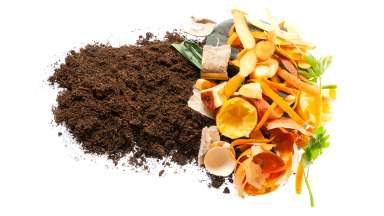North Carolina summers generate a vibrant rainbow of fruits and vegetables. At the Raleigh Farmer’s Market, you’ll see every hue – strawberries, tomatoes, peaches, corn, watermelon, okra, zucchini, blueberries, and eggplant; the list of fresh produce goes on! Once you finish your meal, what do you do with the stems, pits, husks, rinds, and bits you didn’t finish? Instead of tossing it in the trash, you can turn your rainbow remnants into black gold through composting.
Compost is the result of the aerobic decomposition of organic material such as food scraps and yard waste. Gardeners refer to compost as “black gold” because of its value for plants by providing essential nutrients, retaining moisture, and reducing soil erosion. Composting hastens nature’s recycling process and provides your garden with rich soil. In addition to fruit and vegetable scraps which are nitrogen-rich, compost needs carbon-dense components like leaves, paper, and twigs. This balance of “greens” and “browns” is essential to aid microbial decomposition and prevent your pile from getting smelly.
The great thing about composting is that you can do it in your own backyard. Not only is composting good for your garden, but it is also a great way to decrease the amount of garbage you generate and send to the landfill. Wake County offers additional information about composting at home, and they have Convenience Centers locations that accept food scraps in Raleigh. Convenience Center #4 at 3600 Yates Mill Pond Road and Convenience Center #7 at 9024 Dep Drive collect food scraps that are composted by Compost Now. Raleigh Solid Waste Services is currently conducting feasibility studies to explore more options for residential composting in the future.
